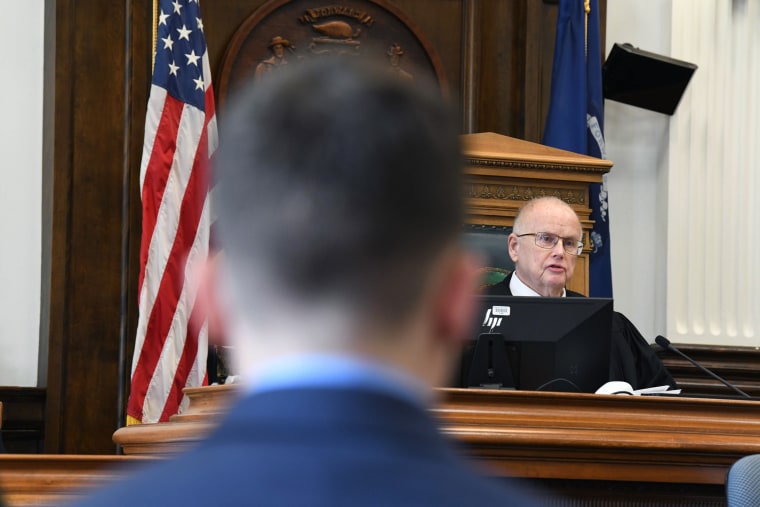When the trial opens of Kyle Rittenhouse, the Illinois teenager accused of gunning down two men and wounding a third during nightly unrest last summer in Kenosha, Wisconsin, one word won't be allowed to describe those who were shot: "victims."
Kenosha County Circuit Judge Bruce Schroeder, however, ordered that other words could be used — "rioters," "looters" or "arsonists" — if Rittenhouse's defense attorneys can provide the evidence that they had engaged in those acts.
As he set the ground rules for the trial, Schroeder said this week that the label "victim" is a "loaded word" and that even the use of "alleged victim" is too close, telling prosecutors that "complaining witness" or "decedent" are acceptable alternatives.
"This is a long-held opinion of mine, which very few judges, I guess, share with me," Schroeder said.

While legal experts and lawyers familiar with state laws say Schroeder is well within his authority to set boundaries on language, his rule sets the stage for further scrutiny in a highly charged trial that has captured national attention since Rittenhouse, who is now 18, was arrested in August 2020. He faces multiple charges, including homicide, in the fatal shootings of Joseph Rosenbaum and Anthony Huber and the wounding of Gaige Grosskreutz.
"That's pretty standard in his courtroom to not allow 'victim,'" said Ted Kmiec, a local criminal defense lawyer who has had cases before Schroeder. "He believes you're presumed innocent, and with that presumption of innocence, nobody is a victim unless it's proven."
Keith Findley, a law professor at the University of Wisconsin and a former public defender, said that while the order is more of a "defense-friendly position," it's not entirely unjustified, because it would "allow the prosecution to continually use language that suggests a conclusion as if it's a given fact to jurors."
On the other hand, he said, words like "looter" and "rioter" carry negative connotations, and it "feels a little bit jarring for the court to ban the use of one descriptor and not another."
Juliet Sorensen, a professor at Northwestern University's Pritzker School of Law, said a judge who wants to appear impartial "should not want unfair prejudice to creep in through any language."
"If the judge is trying to sanitize the language around the events that occurred at that time, I don't know why he wouldn't extend it to those other words," she said. "Describe the events, put in the evidence at trial of what happened that night, and we can avoid all language that is potentially inflammatory."
Kenosha County Assistant District Attorney Thomas Binger, who attended the pretrial hearing, suggested that Schroeder's order is a double standard, the Chicago Tribune reported.
"The terms that I'm identifying here, such as 'rioter,' 'looter' and 'arsonist,' are as loaded, if not more loaded, than the term 'victim,'" Binger told the court, according to the newspaper. He declined to comment further Wednesday.
Civil rights lawyer David Henderson, a former prosecutor in Texas, said on MSNBC that even if any of the men who were shot had engaged in criminal behavior before the encounter, "that wouldn't have given Kyle Rittenhouse the right to shoot them."
It's unclear what evidence the defense might have in that regard. An attorney for Rittenhouse, Mark Richards, didn't immediately respond to a request for comment.
Rittenhouse has pleaded not guilty. Armed with a semiautomatic rifle and acting on calls on social media, he left Illinois to respond to the demonstrations in Kenosha, where a police officer had shot a Black man, Jacob Blake, setting off a wave of protests against police brutality. Rittenhouse's defense team is expected to argue that he was attacked as he was trying to protect businesses from looters, prompting him to open fire in self-defense.
In the lead-up to the trial, Schroeder had thrown out pretrial motions from both sides, including an attempt by prosecutors to submit evidence that they said would show Rittenhouse's tendency to act like a vigilante and the defense's request to include evidence that one of those who were shot was a convicted pedophile.
"He is a very no-nonsense judge," Kmiec said. "I would not put a label on him, but I think he's fair."
Schroeder, 75, a former Kenosha County prosecutor, has been a jurist for more than four decades. He is the longest-serving active circuit judge in the state, according to the Milwaukee Journal Sentinel, having won re-election in 2014 unopposed.
He has overseen hundreds of cases on the bench, notably one in the 1980s, when he ordered a convicted child molester who also engaged in prostitution to get an AIDS test because he had the ability to ''carry death into people's homes."
John Anthony Ward, a Kenosha lawyer who represented the man and objected to his testing before he was sentenced, appeared before Schroeder in more than 30 jury trials over the years and has disagreed with some of his rulings.
"He's not a pro-defendant judge," Ward said. "Judge Schroeder is going to be Judge Schroeder. He's going to be exactly who he is with or without cameras. He's going to be just as opinionated."
Schroeder was also in the national spotlight in the trial of Mark Jensen, a Wisconsin man who was accused of murdering his wife by poisoning her with antifreeze in 1998. Schroeder sentenced him to life in prison. Jensen's conviction was vacated in April when the Wisconsin Supreme Court ruled that the prosecution couldn't use a letter that his wife, Julie, had written.
Schroeder had allowed the letter and voicemails in the original trial, triggering two decades of litigation. Jensen is awaiting a new trial.
With all eyes on him again, legal experts say, it's important that Schroeder appears as an impartial arbiter of the law in a trial that has residents of Kenosha on edge again.
"The jury is the finder of facts. The judge is the expert, the umpire, during the trial," Sorensen said. "That's how it must come across."

